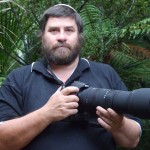SPECIAL OFFER ENDS IN:
As a DPinsiders Subscriber I would like to offer you a Special Discount for EASYDSLR Course... NOW includes the BONUS "The Photo Triangle UNLOCKED" Video
[Free Sample] Discover how to Create the sensation of speed in your action photos ... watch video below
INVEST IN YOUR PHOTOGRAPHY!
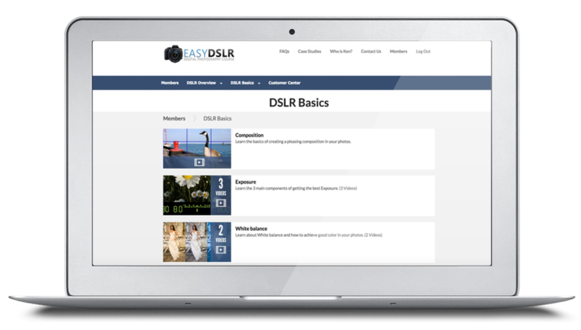
Price $149
Includes BONUS "The Photo Triangle UNLOCKED" Video

60 Days No Questions Asked Guarantee
I have a No Nonsense Guarantee: If you watch the Videos in this Course and find that either: Your Photos are not Improving through applying what you learn, You don’t like my Accent 🙁 or for any Reason you are not happy with the Course send me an email in 60 Days of Buying and I will refund every cent you payed – no questions asked!
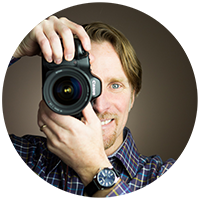
From: Ken Schultz
RE: EasyDSLR Blue Membership Course
Dear Fellow Photographer,
If you are a lot like the DSLR owners I have worked with, you may be finding all the technical details and settings on your DSLR overwhelming.
Getting professional looking photos with a DSLR camera is certainly an art but also requires technical know-how. It also requires some understanding of the Fundamental Principles in Photography.
It's not Rocket Science but can be confusing...
Trying to piece together the information you need to feel comfortable with your camera and get predictable results can be very difficult online. Too many choices and very often the information is scattered and not organized.
You can get great photos with your DSLR camera with luck. But if you are like most of my members you want a more systematic way of improving your photography. You want to get consistent results and when you DO get a great shot you want to know WHY so you can repeat it.
The good news for you is I created EasyDSLR, the step-by-step course that will have you taking more professional-looking photos in just four hours.
EasyDSLR is for true beginners...you don’t need to have any prior experience or know-how.
In just a few hours, you’ll discover how easy it is to switch your camera off of auto settings and start shooting stunning photos, just like the pros.
This tested, proven photography course will work for you, EVEN IF you:
- Have never used a digital SLR camera before…
- Use auto settings every time you take a photo…
- Have labeled yourself as “terrible photographer”…
Or, even if you DO know a thing or two, and you simply want to “fill in the gaps” so you can take more consistent photographs…
What will you Discover?...
What's Covered with Your BLUE MEMBERSHIP
On Your Membership HOME Page you will find Your ORIENTATION Video that gives you an Overview of the whole course and shows you The Photo Triangle - the "Map" that shows you how all the Main Principles are connected to produce a Great Photo!
DSLR Overview module
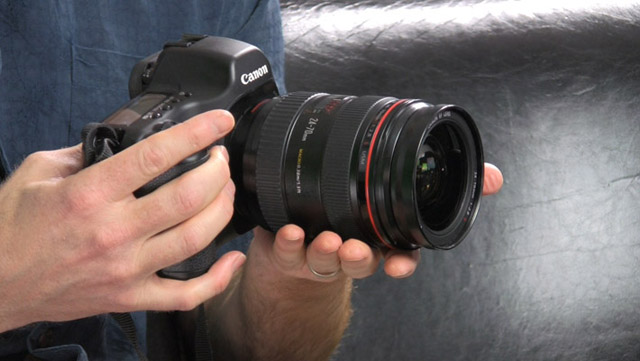
-
1
What's a DSLR?
Video Length: 17 min 26 seconds
Take a Tour of your DSLR camera and it's Benefits:
- Quick Tour of a DSLR
- Strengths of DSLR Cameras over Point and Shoot
- Overall Benefits to your Photography
-
2
DSLR Essentials
Video Length: 10 min 00 seconds
Learn the Essential items you MUST have in your DSLR Kit:
- Get your DSLR Essentials Check List
- Find out the MINIMUM requirements for Your DSLR Kit
- Learn what other "Essentials" will really help with Your DSLR Photography
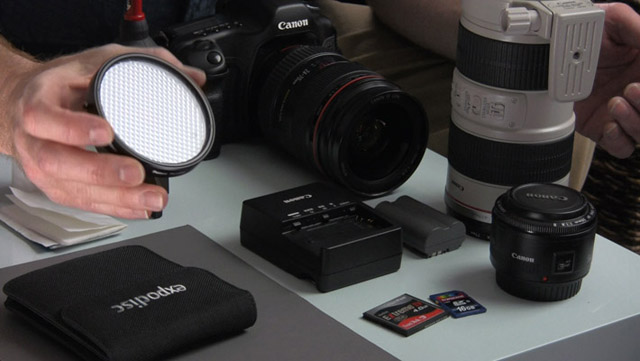
DSLR BASICS Module
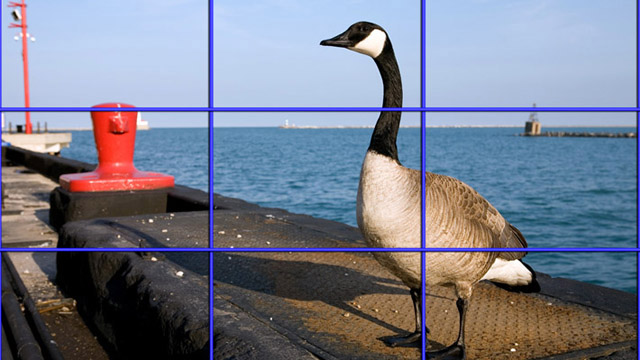
-
3
Composition
Video Length: 38 min 50 seconds
This video deals with the FRAME part of The Photo Triangle including:
- Focal Length Demystified
- Lens Choice and Prime vs Zoom
- The GOLDEN MEAN in composition
- How Autofocus Points in your Viewfinder Improve your Compositon Overnight
-
4
Intro and ISO
Video Length: 22 min 27 seconds
An Introduction of Exposure and the LIGHT corner of the Photo Triangle, including:
- Exposure Metering Modes
- Dynamic Range of your DSLR Sensor
- The super important Histogram
- Correct” Exposure can be an Artistic Choice
- How ISO fits into exposure and what values to use
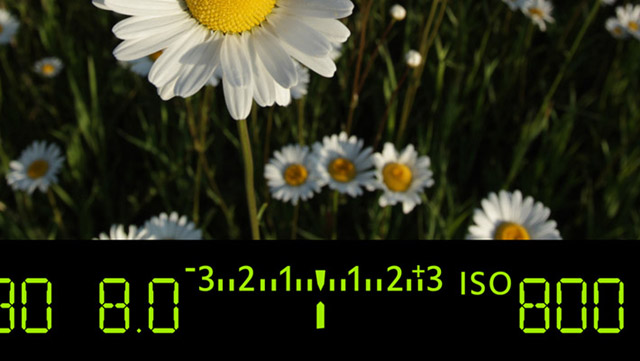
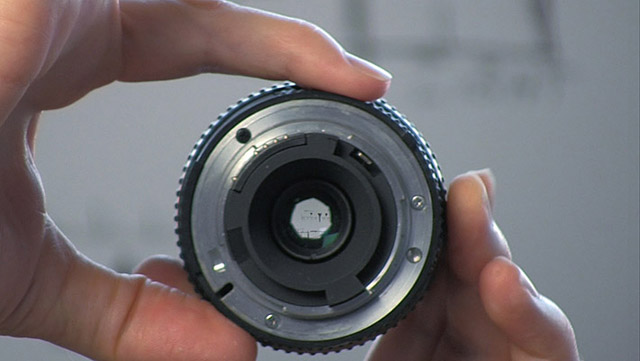
-
5
Aperture
Video Length: 9 min 43 seconds
This Video explains Aperture a Key setting that affects Exposure (LIGHT corner of The Photo Triangle), including:
- What is Aperture?
- The Light Path to your DSLR Sensor
- The Lens “Speed” or Aperture rating of your lens
- Aperture Priority Mode (finally getting off “Auto”)
- Affect of Aperture on Depth of Field (more details in Depth of Field video in Focus section)
-
6
Shutter Speed
Video Length: 39 min 45 seconds
We will look at Shutter Speed – another key setting that affects Exposure (in the LIGHT corner of The Photo Triangle)
- What is Shutter Speed
- Shutter Priority Mode and Manual Exposure Mode
- Affect of Shutter Speed on Sharpness and Blur
- 2 Causes of Motion Blur – How to ‘use them or lose them’
- Pan Method for enhancing the sensation of Speed
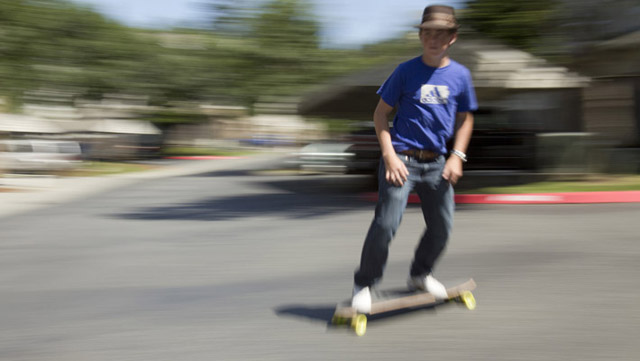
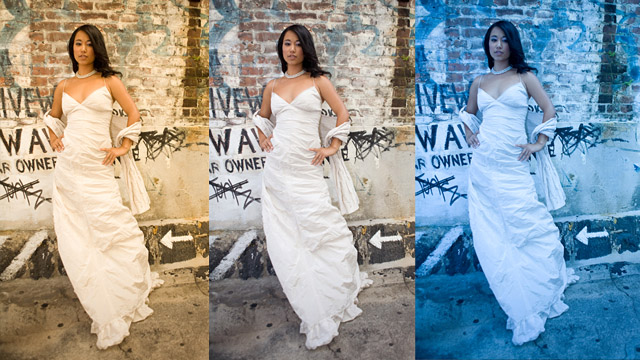
-
7
White Balance Basics
Video Length: 16 min 08 seconds
White Balance – the key setting that affects Color (in the LIGHT corner of The Photo Triangle), including:
- What is White Balance and Why do we need it?
- White Balance Presets
- Color Temperature or Kelvin and the color temperature of different kinds of light.
- Using White Balance Shift to correct white balance
-
8
Custom White balance
Video Length: 16 min 19 seconds
White Balance Bracketing and Setting Custom White balance for accurate color:
- White Balance Bracketing
- Two methods of setting Custom White Balance
- Using Color Histogram to understand Custom White Balance
- What to use in Tricky Situations
- Why Perfect White Balance is not always what you want – creative use of white balanc
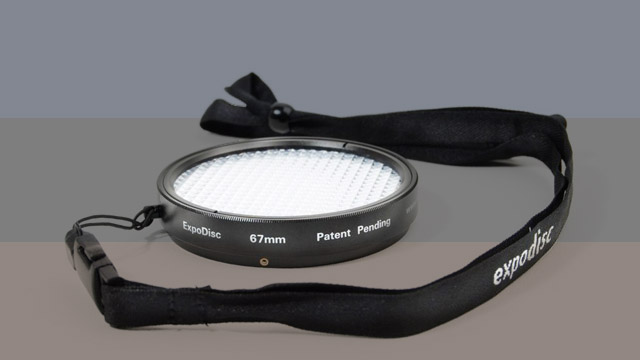
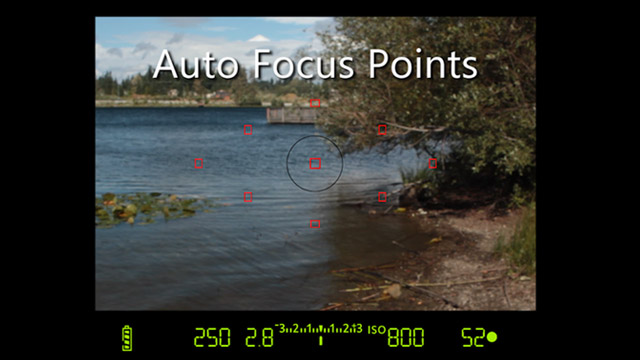
-
9
Focusing Basics
Video Length: 11 min 25 seconds
Learn the Basics of Focusing including Auto Focus Modes and Manual Focusing (the FOCUS corner of The Photo Triangle
- Autofocus Modes
- Types and Selection of Autofocus Points
- My best method for using Autofocus Points
- Hybrid Method of Manual focus
- Focusing using Live View – is it too Slow?
- Manual Focus and Live View
-
10
Depth of Field
Video Length: 12 min 31 seconds
Depth of Field (DOF) is a key concept to understand and master to become more creative with your Photos, learn:
- What is Depth of Field?
- The 3 Main effects on DOF
- How to Isolate your Subject
- What is Hyper Focal Distance?
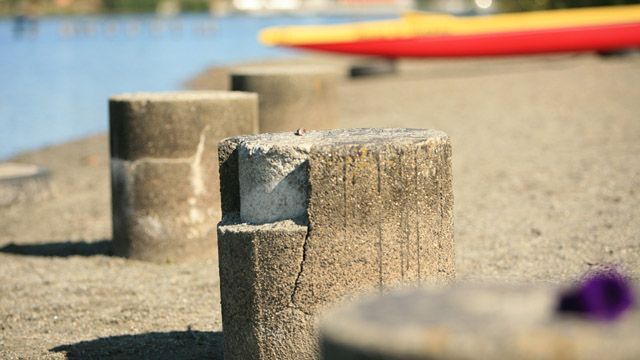

-
11
Flash Basics
Video Length: 26 min 57 seconds
In this video you will learn the Basics of Flash Photography including:
- 3 Main situations to use Flash
- Balancing the background by using Manual Exposure
- Creative use of Flash to Freeze Water
- Brief description of First Curtain and Second Curtain Flash firing
- Flash Exposure Compensation
-
12
Flash Diffusers
Video Length: 15 min 57 seconds
No more "Deer in the Headlights" Portrait shots by using Flash Diffusers:
- Hard versus Soft Light: The real benefit of Diffusers to your photos
- How Flash Diffusers can give you more Flattering Portrait photos
- How to unlock your Flash photography with off-camera techniques
- Why having the light source (or main flash) slightly from above leads to better portraits
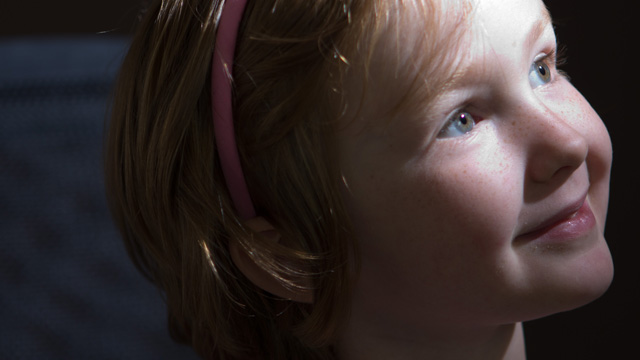
BONUS VIDEO FOR TAKING ACTION TODAY...
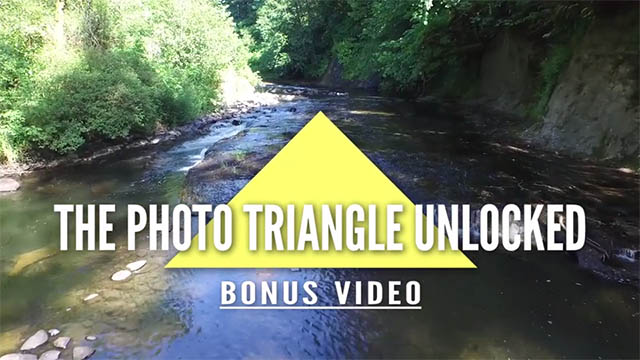
-
B
The Photo Triangle Unlocked
Video Length: 15 min 57 seconds
BONUS: Discover How The Photo Triangle is used "in the Field", including:
- Simplify taking great photos by knowing the Key elements
- Remember Key Values so you can instantly dial in the settings you need in any situation
- Discover how the Photo Triangle helps you think about taking awesome shots
- This Practical demonstration of the Photo Triangle 'in the field' will help you dramatically improve your photography approach
INVEST IN YOUR PHOTOGRAPHY!

Price $149
Includes BONUS "The Photo Triangle UNLOCKED" Video

60 Days No Questions Asked Guarantee
I have a No Nonsense Guarantee: If you watch the Videos in this Course and find that either: Your Photos are not Improving through applying what you learn, You don’t like my Accent 🙁 or for any Reason you are not happy with the Course send me an email in 60 Days of Buying and I will refund every cent you payed – no questions asked!
It will be wonderful if you decide to join us in the EasyDSLR Membership area and take this bold step to improving your photos today.
Click the "GET STARTED NOW" button below to begin your journey to better photos... Guaranteed!
Wishing you all the best with Your Photography!
Cheers

Ken Schultz
Photographer and DSLR Mentor
"So how do I get started?"... It's easy
Just follow the simple steps below and you will be instantly on your way to better photos
-
1
Click the " GET STARTED NOW" button ABOVE!
This will take you to a Secure Checkout page where you enter your credit card details and an Email address you will use for your Membership
-
2
Confirm Payment to go Directly to Your Membership Area
You will be sent an email (to the address you enter at payment) with your Login Details for future reference (check your spam/junk folder if you don't see it in your Inbox)
-
3
Watch the Orientation Video and Dive in!
The Home page of your Membership Area has an orientation video that introduces the PHOTO TRIANGLE (essentially the Mind Map of the Core principles) and talks about the structure of the course. For total beginners I recommend following the BLUE Videos in order for a solid foundation.
Watch on Mac, PC, iPad or iPhone - Anytime!
Streaming Online Videos mean you will always have Access to your Videos wherever you have internet. LIFETIME ACCESS so NO Hurry to watch the Videos - go at YOUR OWN pace.

Get the Essential know-how to start taking more professional looking photos with Your camera...
- Over 4 Hours of Concise Online Video Training
- How the Photo Triangle makes learning photography easier
- Get a Quick Tour of the DSLR Camera and Essential items
- Learn the Composition Secret of the Great Master painters
- Understand Exposure and the Key Settings to Master it
- Discover what Camera Modes Pro Photographers use
- How you can use Shutter Speed Creatively
- Truly understand White Balance and why it matters
- Autofocus, Manual Focus and the "Hybrid Method"
- Learn to get Professional Looking photos with Depth of Field
- Discover the 3 Main uses of Flash Photography
- Unlock the secret to more Flattering Flash Portraits
Reviews From Happy Members
Hi Ken, it was a great day for me when I subscribed to your videos. Your teaching style is fabulous. You present at a pace that is easy to listen to, your whole presentation is fluid and your coverage of a topic is comprehensive and easily understood. Like I said, a great day for me. Thanks
Kerry Feighan EasyDSLR Gold Member
I managed to scrape together enough money for a DSLR camera when my son was born last fall, and although I have a lot of experience with image editing (GIMP), I was clueless with cameras. After stumbling through random and conflicting online resources, my wife bought me your course (both) for my birthday. I really appreciate how you take these concepts and make them simple and approachable, and take the time to go through examples; you are a real pleasure to watch and listen to. You’re a fantastic teacher, and now I am completely in love with my camera…
James Young EasyDSLR Member
Clear concise videos. I really enjoyed this course. It reinvigorated my desire to go beyond the auto menus and gave clear explanations about the technology and terminology of modern DSLR’s. I feel much more confident to try new settings and experiment with flash. Canon users will find it especially useful, as many examples use Canon cameras, but non Canon users will find it equally accessible.
Chris McKernan EasyDSLR Member
I am now in week 4 of the video series and WOW even on the basics I have learned so much. Some of the technical information that I have in the past just glossed over, I now have firmly fixed in my head and photography.
I find the video series very well structured and very well presented. The information is all put across in an easy to follow and understand way even for the least experienced of photographer. It is a pleasant pass time sitting watching these videos and learning at the same time. If I can make one recommendation it would be that every student get a note book and a few different colour pens before you start, you will need them.
Ken thanks for all the hard work you have put into this video series, from my point of view it is well worth it.Colin Meaden EasyDSLR Gold Member
I have previously just messed around with photography, but could never understand f-stops, ISO, shutter speeds, etc, so bumbled my way through on Auto, which was fine, but limiting. I have decided to move into wedding photography, but learning all the technical bits really put me off. I’ve done Ken’s course, and now I get it.
The material is delivered in a clear, easy to understand way. I have just bought a new Nikon D800 – and picked up the manual yesterday – I was amazed at how much I actually understood. I have never even opened a previous manual as it was just too daunting!Kayla Christie EasyDSLR Gold Member
Case Studies of some EASYDSLR members...
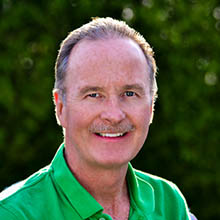
RICH HEALEY
EASYDSLR Member
Click below to hear an interview with Rich Healey
Transcript
- Rich
And then there’s another level that takes that basic understanding and gives you opportunities to be more creative. So taking night time photography, night time pictures. Taking time lapse photography. Taking pictures of things super up close - they call that macro photography. You go through the basics, you practice, you have a good understanding and then you go on to the more advances where the real fun begins and you can experiment and try different things.
And then when a period of time goes by where it’s been a while since I’ve done an exposure of the moon for instance. I go back to his video course and I know right where I can find it, and refresh the information and then I’m good to go.
Everything is in one place, I don’t have to fiddle around on the internet looking to find out about night time exposure and a whole bunch of hits and where do I go from there? And then maybe I want to do something for time lapse photography. Everything in one place, follows a nice flow and is not hard to follow.
- Sharon
So you said there were special things in the advanced. What kind of special things were there, there? I mean I wouldn’t even know what to think about to ask.
- Rich
Sure, I have his website pulled up here and I’m looking at it so some of the things, portraits for instance and I see a beautiful picture here I’m looking at you here. Somebody took your portrait.
- Sharon
Right, right.
- Rich
There’s a whole technique of how to take good portraits so he covers that gives us kind of an overview of some of the important things about how you take somebody’s portrait.
Night time photography He goes to downtown Seattle and takes some REALLY, REALLY cool pictures. You can’t just do that. You can’t just go down and put it on the automatic settings and say ok I want this picture. So things like night time photography, nature photography, landscape photography beautiful scenes of different venues and all of that. Upclose so you can see pictures of flowers or insects, There was one time after I looked at that I went out the next morning when the, the sun had come up and the dew was on the grass and I set the camera setting to just right and I took a picture of a blade of grass with a drop of dew on the end of it. And when you look at this picture … everything in the background is, is kind of blurry but the picture itself the, the drop of water came out crystal clear and you can see reflections of the blades of grass. And it is it’s just one of my favorite pictures. Again never would have known.

- Sharon
Sounds so cool.
- Rich
It just really is cause as I say, it’s all available to you if you know how to use your camera. And by going through that course he shows you those basics and then with the more advanced kinds of things you can do he talks about how you can make that happen. And the other thing too is, you don’t need to have a lot of fancy gear. And that’s always been kind of intimidating to me. You like a really nice picture and you see the people taking them and they’ve got lenses on it three feet long and, and all kinds of things. Thousands of dollars and I figure there’s no way I could take pictures like that. And then he shows you, you really can. And so he takes you through this is what you can do it with and if you want to make it a little bit more and do more things with it then there’s other equipment you could purchase.
I’ve kept a list of “nice-to-have’s” so that when I put a little money away then I will buy a certain type of lens or I’ll buy an extra flash or a filter to go on the camera to sharpen things up on a sunny day. Again the thing I like about the course is after you look at the features of a particular lesson you go right out, you can use the information right away and you can see the results and you don’t have to have a lot of fancy camera gear if you don’t want to.
- Sharon
Were there any ways that he exceeded your expectations? Because it sounds like he met them.
- Rich
Yes. One of the things I reflected about that I thought was different than any other course that I’ve seen is he goes into a little bit more in depth about, about how things happen. He doesn’t just say ok this setting will allow you to do this. He goes into a little bit more explanation about why that setting allows you to do this. One example would be there’s a thing in photography called white balance. Sun shines provides one kind of light. A florescent light provides you with a different kind of light. And you have to understand that a little because when you take a picture of something, if you get it in the sunlight, the color white is going to look a little different than florescent bulb. Ok? So he goes into explanation about why that is and how you can adjust for it so you get a true picture of a true white color regardless of what your light source is. Or that idea I was mentioning the background, you can either have blurred, which is favorable if you want to focus in on one subject like a portrait, or maybe you want the background to be in focus. Give you perspective. And a great, great picture of my son playing soccer and a picture of him taking a shot at the goal and you can see the goalie hit it his hands are out, two defenders are next to it and you can just see this ball is gonna go in the net. It looks like he‘s about five feet away from the goal but in reality he was about thirty feet away from the goal. And you can see in the background everything is pulled more closely because of the lens I was using. So I was able to achieve this because of some of the information that Ken had talked about. He goes into a little bit more in depth, a little bit more of the science behind why things are the way they are. And I’m interested in that and it helps when you remember what should I be thinking about when I’m trying to achieve a ….. picture.

BEFORE EasyDSLR - Some shots Rich was having trouble with::



AFTER EasyDSLR - Photos Rich is proud of:





ANDY ROSE
EASYDSLR Member
Click below to hear an interview with Andy Rose
Transcript
- Andy
Yeah, it all started in me looking around for DSLR camera for the family for holiday pictures and general pictures and stuff and I didn’t know a lot about it and I don’t know how I came across it but I found Ken’s DSLR guide online and I managed to download it and have a look through the DSLRs on the guide and so I picked the DSLR that we could kind of afford. I think I email Ken about it at one point as well and he emailed straight back which was sort of really cool and I found that really helpful.
- Dr. Sharon
What did you email him about?
- Andy
What his thoughts were on the camera obviously he had put it in the buyer’s guide but I just, obviously before shelling out that amount of money, I just wanted to sort of make sure I was making the right choice.
At which point I followed up online to his website from that email address and which was I think the photography side not the DSLR, the DSLR course which then sort of got me onto the course.
I had ordered the DSLR and all that kind of stuff and didn’t really know what I was doing with it and just assumed I would get good photos because it was a good camera .
At which point I sort of thought "Well I am investing all of this money in a camera I want to start investing in some means of training to kind of get me through it".
So I had a look online and followed up on Ken’s e-mail and I found the course and looked across a couple of the introduction videos on his website which were free and just found personally that it just kind of was my learning mechanism, it was how I took things in.
So looking at it on a video. I am not the sort of person who can read a book or anything like that I'm very hands on and just sit with my camera in front of a computer and watch a video of somebody showing you how it works and in particular that the camera that Ken showed you on was the one I had which was really cool.
It was just really easy application.
He had it there you had it in your had as well, you could just dial up the settings and take some really practical examples and I think that is what it's kind of based on really.
It’s a practical kind of course - visually based
So that's how I learned. So I am only about 3/4ths of the way through the course at the minute but I have just found Ken sort of dedication to the course just brilliant.
It's great how he has got, underneath every video he has got a comment section, he personally responds to every single comment and I have e-mailed him aside from the course just asking him advice on things and he has e-mailed straight back. He's just a really great guy and really helpful.
I just personally feel that without this kind of course that I had done, had I just gone down the route of buying the DSLR and under the assumption that I would get good photos without this additional training, I wouldn’t be in the place that I am now having come back from Disneyland and got stacks of great photos of the family - you know.
So I look back and feel I owe to Ken for that. Just really positive stuff.
- Dr. Sharon
Are there a couple of things that you have learned that stick in your mind like "oh wow" that was really useful or that made a difference?
- Andy
So many things, on the bottom of every video I think I put a comment on there or a question and just saying how great that was and just how I have never thought about it that way before, I always thought about certain things a certain way and just how we explained it and referred to certain aspects of the camera and the settings that were just kind of:
"Oh! that is really simple but I never thought about it that way before" if you see what I mean.
- Dr. Sharon
Can you give me an example?
- Andy
I guess something about Aperture on the camera. Just kind of how he utilized that, I understood the basics of it, but kind of in the Depth of Field side of things trying to get better photography with a number on the aperture to kind of create a wider in-focus area on the screen.
Because I had only done sort of half the course when we went away to Disneyland and I found myself using, tending to mess about with the shutter speed a lot and not tending to touch the aperture setting.
But then, towards the backend of the course I kind of started messing about with the aperture and actually seeing the results of that.
- Dr. Sharon
Do you have any pictures you are particularly proud of that you could share?
- Andy
Probably, given that I came back with 6,000!
- Dr. Sharon
Oh my goodness! Oh my goodness!
- Andy
Yeah, which Ken's also referred me onto a guy called Phil Steele who does a course on Adobe Lightroom which has also been really helpful to sort of work with your photographs because there are so many of them, it’s a bit of a nightmare to try and filter them down to a manageable quantity.
- Dr. Sharon
Very very cool.
Anything that I left out that you might want to tell people if they were considering taking Ken’s course?
- Andy
Financially, you are spending in excess of 1,000 pounds on a camera.
You spend what 50-60 pounds on the course?
I mean that’s really nothing... compared to the results that you get from using the camera.
So if you buy the camera on its own and you don’t do this course I am thinking; my example, if I just bought the camera and not done the course I think I would be in a very different position now to what I am having done the course and seeing all the rewards from that...
BEFORE EasyDSLR - Some shots Andy was having trouble with:





AFTER EasyDSLR ** insert Drum-Roll ** Some Awesome shots Andy is proud of:











SHARON LEACH
EASYDSLR Member
Click below to hear an interview with Sharon Leach
Transcript
- Dr. Sharon
So I was wondering, how did you come to the course? Why were you interested in taking that course anyway?
- Sharon
Well I’ve always enjoyed photography and two years ago I decided to really get into it and try to understand it more. My husband bought me a new DSLR camera and I wanted to know how to work it besides automatic. (laughs) So I looked on the internet and came across Ken’s class and decided to purchase it. Of course I bought the other program too, the gold, as I got more into photography, and really enjoyed it. The first video that I saw which was free, I really enjoyed what I saw of it.
- Dr. Sharon
you know I’ve never seen it. What does it show?
- Sharon
That was a long time ago. It’s been two years since I watched that one. I think it was on depth of field is what it was if I remember right. And just the aperture part of it. Of course at that time I didn’t understand a thing, so I knew that he was going to explain… as well as he explained that portion of it, I knew that I could learn from him. And I did. I learned volumes from him.
- Dr. Sharon
What kind of things? I’m not a photographer so what kinds of things did you learn?
- Sharon
Oh ok. Well I learned… a lot of it is still a little bit over my head but I learned what the aperture was, what shutter speed was, and depth of field. A little bit of Photoshop not a lot. I hadn’t gotten Photoshop the time I watched his video so I didn’t watch that one real closely which I want to go back because I finally got a Photoshop program. Just the basics of how the camera works and how to work with lighting and especially with manual and how to get the exposure that you want to get of each picture and just like I told Ken I was like a sponge and I was just taking it all in. I learned a lot of the basics but he went beyond that as far as the lighting and the depth of field and getting bokeh and all of that. It was just fascinating to me.
- Dr. Sharon
What’s the value of that in terms of your photography?
- Sharon
The value of it for me is I’ve always been a point and shoot camera type person. And when I got my DSLR I decided right away that I wasn’t going to be that way with that camera because I knew it could do so much more. He didn’t really go into another lens but his portrait photography I wanted to get more bokeh in a lot of my pictures so I bought just a 50 mm lens cause of the f-stop on that, and that’s with the aperture, the f-stop on that was a lot higher. I get more bokeh in the back of my pictures and I really can’t put any value on it other than it just helped my photography so much so quickly I guess you could say. It was really amazing to me because I would talk to other photographers and how have you done this and I said well I’m just learning. I’ve only been in it for about a year. They’re really quite amazed that I knew as much as I did and I said well I just took a class and I think the guy that taught it was so informative and did such a wonderful job. That’s how much I value it. really it just helped me leaps and bounds and I’m just taking it and just ran with it.
- Dr. Sharon
What is it about the way Ken teaches?
- Sharon
I think for me I learn by seeing. I’m not a reading person. I have to actually see what you’re doing. With his videos he would go out in a field and actually explain to you and show you exactly what he was doing and what the cam and what kind of picture you were going to get doing this shutter speed and this aperture and this exposure and everything and this depth of field and so for me to actually see it helped me immensely and he explained it so well. So that’s what helped me was actually seeing the video and I learn by sight I don’t learn by people telling me.
Obviously there’s both but I learn a lot faster and lot better if I can actually see what’s going on. Rather than read it then try and work with it.
- Dr. Sharon
What is it about taking pictures do you think?
- Sharon
Oh man it’s just so rewarding I just love it. I get out there and take pictures of birds and I do macro photography and just to see sunsets I absolutely love sunsets. And to see the picture that you can… and just the creativity of it all. Of getting shadows and in different pictures that you can just capture and you can show to people and say this is what you miss. A lot of people, we don’t
sit there and look at a sunset. We don’t sit there and look at how different lighting works when the sun hits this area you got shadows and it does different things I guess it’s like capturing a bird for me It’s just fascinating. And I love birds. And dogs I love taking pictures of my dogs and seeing if you can get the expression and how it comes through the picture and getting the emotion that comes through it I think. It’s just fascinating to me. I have never always been this way I’ve never thought of myself as a creative person. And my brother who just recently got into photography was a painter growing up and he was very creative and he was kind of surprised that I was into photography because I have never been a creative person. And he says but I see you talking about it and you really do have a creative eye for it and he says I just would’ve never thought that you would. (laughs)
- Dr. Sharon
How cool is that? Wow.
- Sharon
Yeah I thought it was pretty cool. So I guess for me it’s just a different kind of creativity and art. To see different things is so neat. And how other people look at different things. I see pictures of what other people take and I think, Hmm I’ve never seen it that way. And it just kind of tells a story and it’s fascinating to me.
- Dr. Sharon
And so if you were going to be describing this program to a friend who was interested what might you say?
- Sharon
You really want to know how your camera works and all that it does. I would highly recommend Ken because he explains it so well. But I think the first thing I would tell the person is to go ahead and look at the first video that he has for free. And if it appeals to you and how his teaching method is, I would go. Like I say people just learn so differently. And for me with how he had the charts and everything and the way the coloring and everything I really wanted to know the basics. I come across a lot people and they just want to take pictures. And I wanted to know why that picture was coming out that way. And so I guess it depends on why people are taking pictures. Is it just cause they want to take pictures of their family or whatever,. I wanted to go deeper than that and so if I were to talk to somebody about the program I would say If you really want to learn how to do photography I would highly recommend this program to you. His videos.
BEFORE EasyDSLR - Some shots Sharon was NOT happy with:


AFTER EasyDSLR - Photos Sharon is Super Happy with 🙂



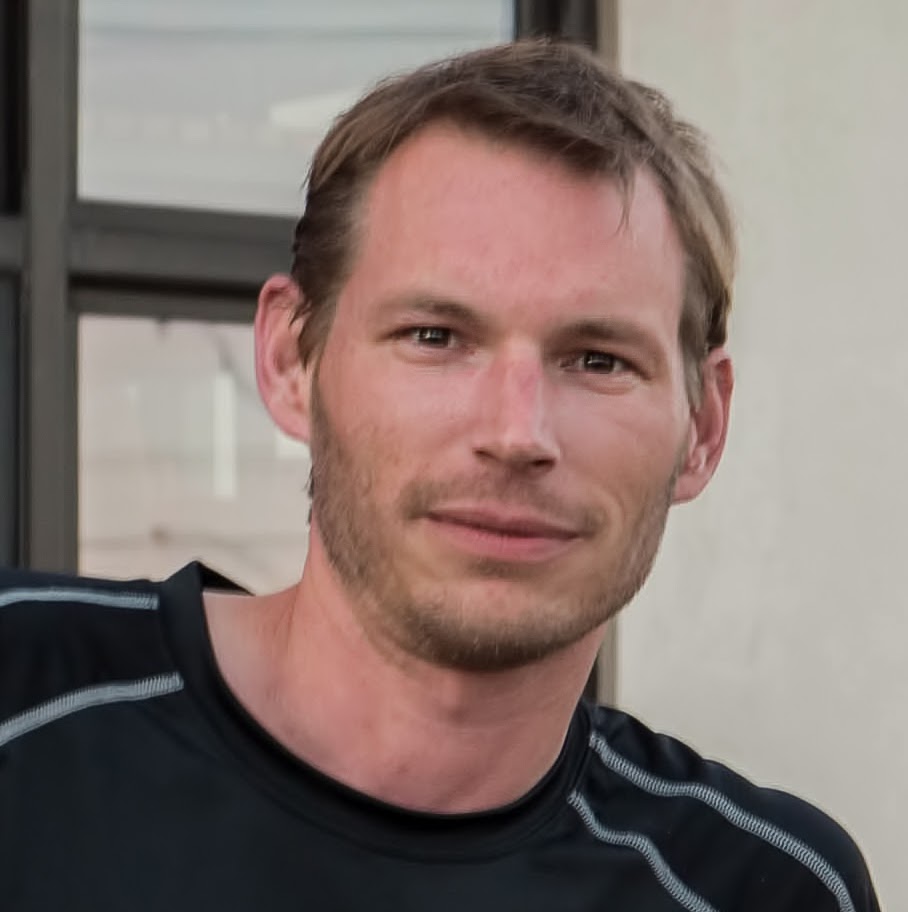
CHRIS ELLIS
EASYDSLR Member
Click below to hear an interview with Chris Ellis
Transcript
- Chris
From a user’s standpoint, I guess all I did is just kinda start going through ‘em all. And I’m one these type of people that um, you know, I don’t do a video and then practice for a week. I’m more of the type that okay I heard that and now lets go to the next thing and keep going, and going, and going and then along the way um so anyways I kinda blew through these courses within, Oh man, probably three or four days and then you start going out and experimenting and doing these things and , you know, go back to them as a reference at that point so it kinda built up all the knowledge as much as I possibly can, go out put it to practice and then come back as a reference. So thats really what I do right now with it, just so you know.
- Ken
Yeah
- Chris
Um, and I think a lot of people are probably that way too. Um, but anyway, so I mean just the way you put things and explain them um I mean this is awesome and it really is. Just, you know, the structure you have for it all any everything. Um, in terms of the photography stuff you know a lot of this, well and once again you know I’m a beginner at it obviously, and so I went out and got a Nikon D7100 and you know was like, you know, well I had a DSLR before that an old Cannon Rebel EOS
- Ken
Uh huh
- Chris
… and then so I really, I really stepped it up going to the Nikon D7100 and I was like “you know I really need to be more serious with this, I know I can do it, um you know and but how?” You know,like, what is composition - what is all this stuff? I don’t know, you know what I mean, so I can go out and take a picture but didn’t really, you know, know a lot until then. So like the rule of thirds, all those things uh I put into practice on virtually every picture that I take. And so whats nice about that camera you can have your grid uh show up right there in your viewfinder, get it in a nice ballpark, and then once you go on to your photoshopping and things like that, you know, turn the rule of thirds on there and crop it just the way you want it. Get that, you know, get that flow that you’re going after. And so it tremendously improves what I can do - no doubt about it. So the, you know, that whole aspect was just a big, big eye opener for me - no doubt about it. So I know how to work the buttons and I know what aperture is. I know what this is and , you know, how shudder speed affects other things and uh but “how do I use that?”. And thats where your courses really came in handy to me. It put it into more of a practical sense um definitely with the photography.
- Ken
okay
- Chris
Uh the time-lapse photograph, the time lapse photography was probably my, one of my favorite parts I’ll be honest.
- Ken
OK, yeah
- Chris
…so I never knew how to do a time-lapse and that was pretty cool. So now I can get these cool sunsets coming across our house here uh so that was fun.
Some of Chris's recent shots



THE BENEFITS OF ONLINE TRAINING

Instant Updates
Any updates to Course material are instant

Lifetime Membership
No Hurry – Work at your own pace

100% Money Back Guarantee
You are covered with a solid 60 Day Guarantee!

Watch on your Devices
Access via Computer, Tablet or Smartphone
INVEST IN YOUR PHOTOGRAPHY!

Price $149
Includes BONUS "The Photo Triangle UNLOCKED" Video

60 Days No Questions Asked Guarantee
I have a No Nonsense Guarantee: If you watch the Videos in this Course and find that either: Your Photos are not Improving through applying what you learn, You don’t like my Accent 🙁 or for any Reason you are not happy with the Course send me an email in 60 Days of Buying and I will refund every cent you payed – no questions asked!
As seen on:











